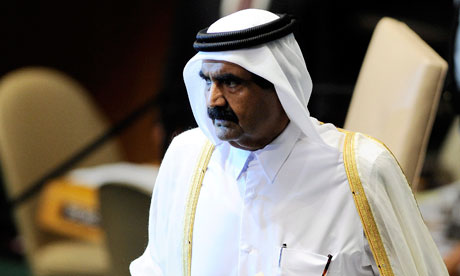In April 2006, an article on Al Jazeera's website appeared which quoted Emir Hamad promising that legislative elections would be held early the following year, as part of a larger process of "democratization" in the tiny Gulf Emirate. Fast forward 6 years, and we get the Guardian reporting the same thing. In-between, the proposed elections (which are constitutionally mandated, but try and tell that to the Emir) have been constantly delayed as the Emir refuses to give up his ability to appoint all 45 members of his Advisory Council. Yet in June 2013, those elections are finally going to happen. No, this is not just another bit of wishful thinking on the part of observers--things are different this time in Qatar. The regime watched the events of the 2011 Arab Spring carefully, and actually having the legislative elections, this time, is just another smart move on the part of a very successful regime.
An article we read in class titled "Authoritarian Institutions and the Survival of Autocrats" made the argument that institutions play a critical role in the survival of autocrats, as even seemingly unimportant "advisory boards" can give authoritarian leaders a tool with which to reel in opposition groups and to make them a part of the governing apparatus, thus giving them a stake in the regime's continued survival. Emir Hamad of Qatar has long understood the importance of appeasing any potential opposition in Qatar, as he has been making vague promises of democratic reform ever since he took power in 1995. He even paved the way for Qatar to have its first elections in 1999 for a group known as the Central Municipal Council, which Freedom House notes advises the municipal affairs minister and has a little political power at the local level. Yet despite having very little importance, the Municipal Council's elections draw respectable turnout levels in which 40-50% of eligible voters come to the polls; and as a result, the Emir can get a good feel for the political thoughts and desires of his citizenry without having to trade any real political power to do so.
The Emir apparently felt as though his population was ready to agitate for additional reforms come 2005, as that year the monarchy adopted the current constitution which, among other things, mandated the elections for the Advisory Council. While the Emir felt comfortable pushing back these elections over the coming years, preferring to directly appoint the entirety of the Advisory Council himself, it has been argued that the events of the Arab Spring have made him change his tune, as he announced once again that the elections would be held, this time in June 2013.
 |
| The Advisory Council in its current "Emir-Approved" state. |
And this time, it seems as though the elections really will be held, primarily because (from the Emir's point of view) they really should be held. The article mentioned above makes the point that while inadequate levels of institutionalization can doom an autocrat's reign, over-institutionalization can only help an autocrat endure, as more of the population feels involved in a country's governance and more of any potential opposition can be dealt with directly in a formal way, on the ruling regime's own terms. And clearly, given the events of the Arab Spring, Emir Hamad understands the importance of preempting any possible source of discontent among his citizenry. Also critical to the election actually being held is the fact that it would be nothing more than a symbolic and unimportant change in the monarchy's governing structure. The constitution only calls for 30 of the 45 members of the Council to be directly elected, as the Emir would retain his right to appoint the other 15. And the Advisory Council, while a legislature in name, has little real legislative authority, as it can only propose laws and act in an advisory role to the Emir. As a result, I would argue that Qatar's legislative elections are finally about to happen, as by having them the Emir has plenty to gain and only very little to lose--and the alternative opens up the chilling possibility of tangible political unrest in Qatar.

I definitely appreciate your level of optimism in the prediction that elections will take place this time; however, I am a little more pessimistic in my views of Qatar and its leader. Calling for an election and actually holding an election are two different things. It seems improbable that this leader would suddenly decide, based on what he saw from other countries reactions to the Arab Spring, that real elections are important and will keep him in power. I'm interested to see to what level these elections end up being free and fair and to what level the government uses them as a mirage to distract the people. You stated that Qatar's constitution already calls for elections of 30 members of the advisory council yet the leader has yet to ever allow for these positions to be filled by elections. Since the council is also advisory and not a legislature I'm critical to believe electing members to this council will dampen the people's protests. For example, as we looked at UAE we also saw that they have similar advisory boards for the emirate leaders and these councils do not make the nation anymore democratic.
ReplyDeleteIf the election do actually happen in Qatar, this can be a hopeful a new step toward positivity. If the people are given elections, it will help the people of Qatar feel more involved with their government and have more hands on activity with their country. By permitting the people to be involved in the election process, it will help improve any dissatisfaction against the government.
ReplyDelete